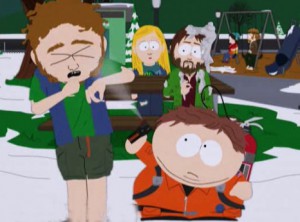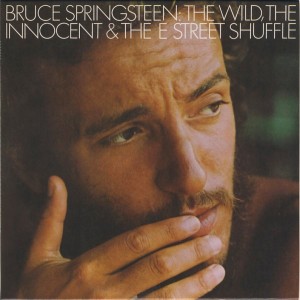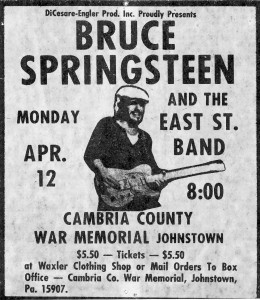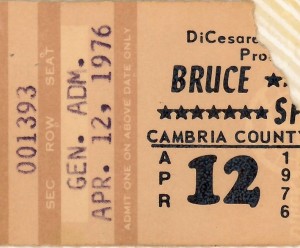If you’re familiar with the darkly funny animated series “South Park,” you know there’s nothing that tubby 9-year-old Eric Cartman hates more than hippies. In the 2005 episode “Die Hippie, Die,” he gallantly waddles from house to house with an exterminator tank, hell-bent on ridding the neighborhood of the bad-smelling, peace-preaching stoners. Well, in my small hometown in the late 1960s, we had but one authentic hippie, and we intended to keep him.
By the time the Age of Aquarius hit Pennsyltucky, it was already the Age of Libra. For years we stared at our cabinet TVs with envy at the scenes of flower-children burning draft cards in Chicago, marching for peace in D.C., and dancing in a hallucinogenic stupor in Golden Gate Park. Just when we’d nearly given up hope that we’d ever be hip, God answered our prayers and gave us something to break the monotony of our boring, bourgeois lives: a bearded, long-haired, blurry-eyed, sandaled dude whom the town elders affectionately called “The Dirty Hippie.” So touched was he by this moniker that he actually painted the nom de freak on the side of his psychedelically embellished pickup truck. You bet your bippy! What a treat to see him whiz by — “Sunshine of your Love” and fragrant smoke wafting from his windows — as we walked home from school. “Hey look! It’s the Dirty Hippie!” we’d cry out as we waved. I have no idea whether our token tokin’ rebel embraced the make-love-not-war ideology of the times, but he looked like he stepped right out of central casting for “Easy Rider.” And that was good enough for us. We didn’t want any trouble-making pinko types, anyway. We weren’t ready for our small hamlet to become infested with the city-bred rodent variety of hippie — like those personified by David Peel.
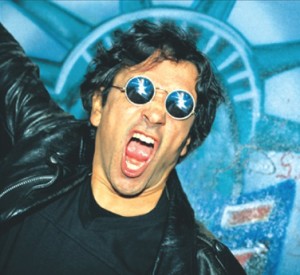 I was 12 years old, watching The David Frost show on TV after school, when I discovered Mr. Peel. As the veddy, veddy British talk show host introduced a musical number, I was delighted to see John Lennon on stage with an assortment of musicians I didn’t recognize. But why was John (and the ubiquitous Yoko) standing in the back, banging away on a homemade stringed instrument, and not in the spotlight? Who was the wire-haired dude with Lennonesque granny glasses shouting into the microphone? And why was he singing funny lyrics to Merle Haggard’s “Okie from Muskogee” song? This was too much!
I was 12 years old, watching The David Frost show on TV after school, when I discovered Mr. Peel. As the veddy, veddy British talk show host introduced a musical number, I was delighted to see John Lennon on stage with an assortment of musicians I didn’t recognize. But why was John (and the ubiquitous Yoko) standing in the back, banging away on a homemade stringed instrument, and not in the spotlight? Who was the wire-haired dude with Lennonesque granny glasses shouting into the microphone? And why was he singing funny lyrics to Merle Haggard’s “Okie from Muskogee” song? This was too much!
I’m proud to be a New York City hippie / I’m proud of dirty feet and dirty hair.
I’m proud of living with the cock-a-roaches / I’m proud of living in a garbage can.
We want to warn you squares and all you rednecks: If you hate the hippies from New York,
We’ll unify the hippies from the country /We’ll fight until the South becomes the North.
Wow! The high literature of Mad magazine set to music! This truly appealed to my 7th grade brain. I would never forget this TV performance, or the name of the singer, David Peel. And I vowed that one day I would learn all about this dirty hippie.
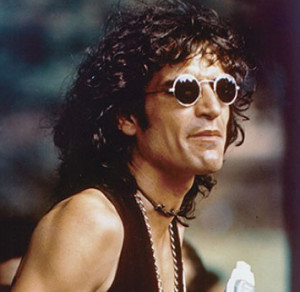 Born David Michael Rosario in Brooklyn, Peel was, and remains, a singer, songwriter, musician, activist, street performer, and self-described radical. In 1968, he and his band, The Lower East Side, landed a contract with Elektra Records and subsequently released two albums that were groundbreaking in theme and content: “Have a Marijuana” and “The American Revolution.” Kudos to Elektra for releasing LPs with song titles like “I’ve Got Some Grass,” “Hey Mr. Draft Board,” “I Want To Get High,” “Show Me the Way to Get Stoned,” and the police-hating “Oink, Oink.” Smells like early punk rock to me.
Born David Michael Rosario in Brooklyn, Peel was, and remains, a singer, songwriter, musician, activist, street performer, and self-described radical. In 1968, he and his band, The Lower East Side, landed a contract with Elektra Records and subsequently released two albums that were groundbreaking in theme and content: “Have a Marijuana” and “The American Revolution.” Kudos to Elektra for releasing LPs with song titles like “I’ve Got Some Grass,” “Hey Mr. Draft Board,” “I Want To Get High,” “Show Me the Way to Get Stoned,” and the police-hating “Oink, Oink.” Smells like early punk rock to me.
Peel has been described as the Woodie Guthrie of Yippie politics. He prided himself on being a street musician – of the people, by the people, for the people – and gained most of his notoriety shouting out his satirical ditties in Washington Square Park in Greenwich Village. Still, outside of New York counter-culture society, Peel remained very much an underground novelty. Until another radically minded singer-songwriter happened upon his act.
One day in 1971, two newly-minted New Yorkers, John and Yoko Ono Lennon, wandered into Washington Square Park with their friend, rock journalist and producer Howard Smith. There, John saw Peel for the first time. The street singer shouted out something like, “Why do you have to pay to see stars?” John thought that Peel was referring to him, and his interest was piqued. It wouldn’t be long before Yippie leaders Jerry Rubin and Abbie Hoffman would lead John back to the park and introduce him to Peel. They hit it off immediately. “He’s such a great guy,” said Lennon in 1972. “We loved his music and his spirit and everything — his whole philosophy of the street.”
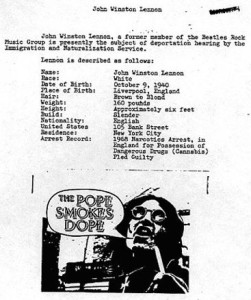 The next thing you know, John signs Peel to The Beatles’ Apple Records (against the objections of some of his former bandmates) and is producing his infamous LP, “The Pope Smokes Dope.” Its title song, along with such tunes as “F is Not a Dirty Word,” “I’m Gonna Start Another Riot,” and “The Birth Control Blues” ensured that the LP would be banned in nearly every country except the United States and Canada. Now, with John’s blessing and a banned record, Peel not only was the new darling of the anti-establishment, he had a free pass to enter the living rooms of Middle America by way of the David Frost show. With his round, wire-rimmed sunglasses and prominent nose, he looked so much like John that the FBI mistakenly used his photo in a fact sheet they produced for Nixon’s “deport Lennon” campaign.
The next thing you know, John signs Peel to The Beatles’ Apple Records (against the objections of some of his former bandmates) and is producing his infamous LP, “The Pope Smokes Dope.” Its title song, along with such tunes as “F is Not a Dirty Word,” “I’m Gonna Start Another Riot,” and “The Birth Control Blues” ensured that the LP would be banned in nearly every country except the United States and Canada. Now, with John’s blessing and a banned record, Peel not only was the new darling of the anti-establishment, he had a free pass to enter the living rooms of Middle America by way of the David Frost show. With his round, wire-rimmed sunglasses and prominent nose, he looked so much like John that the FBI mistakenly used his photo in a fact sheet they produced for Nixon’s “deport Lennon” campaign.
While John went on to produce Peel’s single, “America,” for the soundtrack of the film “Please Stand By,” Apple records did not renew his contract. Wary of censorship battles with established record labels, he formed an independent company, Orange Records, to release his own material and that of other artists. His 1976 LP, “An Evening With David Peel,” has been praised for perfectly capturing the sound and spirit of the chaotic early ’70s underground movement. He’s been recording, without fanfare, for decades. You can download his songs from iTunes and Amazon.com.
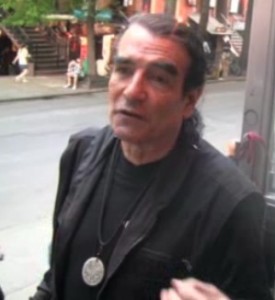
Thanks to Lennon’s association, Peel went from playing parks to stadiums, alongside such artists as Rod Stewart, B.B. King, Alice Cooper, Dr. John, Frank Zappa, Iggy Pop, MC5, John Lee Hooker, Roger McGuinn, Richie Havens, Odetta, Arlo Guthrie, Stevie Wonder, Joan Baez, Cypress Hill, and The Ramones.
But despite his high profile gigs, Peel’s always felt most comfortable on the streets of New York, performing gratis for everyday people. At age 70, he’s still a bachelor, sans children, and lives in a rent-controlled apartment on Avenue B in the East Village. He gets by on songwriting royalties, sales of old records, and the occasional gig. He’s made a comeback in recent years, writing songs for the Occupy Wall Street movement and singing and strumming his way into the hearts of a new generation of rabble rousers. He told a New York Times reporter in 2012 that he plans to continue to sing on the streets and in the parks “until the day I drop dead and go to rock ’n’ roll heaven.”
Let’s just hope there’s plenty of weed behind those pearly gates — if the popes haven’t smoked it all up, that is.
UPDATE: I just leaned that Mr. Peel died on April 6, 2017, following a heart attack. Wherever you are, David, keep stirring the pot!
Here’s David Peel and The Lower East Side, along with John, Yoko, and Jerry Rubin, performing “Hippie from New York City” on David Frost’s show in 1972. It’s a biting parody of Merle Haggard’s “Okie from Muskogee.”
Here are audio clips of John, discussing David’s appeal: “People say, ‘Oh, you know Peel – he can’t sing, or he can’t really play and that,’ but he writes beautiful songs, you know, and even sort of as simple as his basic chord structures are, supposedly. Well you know, Picasso spent 40 years trying to get as simple as that.”
This South Park clip is from the episode called “Die Hippie, Die,” which shows Eric Cartman trying to rid the town of hippies.
© Dana Spiardi, March 6, 2013
]]>
The characters from Bruce’s 1973 LP sprang from the Hollywood-styled world of Hell’s Kitchen, Paradise Alley, and The Boulevard of Broken Dreams. They had nicknames like Spanish Johnny, Puerto Rican Jane, Little Angel, Sloppy Sue, Diamond Jackie, Easy Joe, Little Dynamite. Losers all, but lovable as only Bruce could draw them.
Those outsiders – with their bruised arms, broken rhythm and beat-up old Buicks – are so alive to me, the imagery so vivid – like this scenario from “Incident on 57nd Street,” my favorite Bruce song: Janey sleeps in sheets damp with sweat / Johnny sits up alone and watches her dream on, dream on / And the sister prays for lost souls / then breaks down in the chapel after everyone’s gone. Hokey and overly sentimental? Perhaps. But this is the stuff that makes my heart ache in a really wonderful way. Every lyric and every melody on this LP can still move me to tears. These are coming-of-age songs for me. For we early Springsteen fans, this era – this zeitgeist – is gone forever.
I was 16 years old when I spied a small poster in the window of a record store at the old Richland Mall near Johnstown, PA: “Bruce Springsteen and the East (sic) Street Band – Coming to the Cambria Country War Memorial Arena on April 12, 1976.” General admission: $5.50. I pleaded with my overly-protective mom that I needed to see “the future of rock-n-roll.” And miracle of miracles, she and my dad agreed to drive me to the show. (She must have had a sixth sense about “sure things,” having plopped me down in front of the television at age 4 to witness the Beatles’ debut on the Ed Sullivan show. “This will be important one day,” she said.)
It’s funny…I was a junior in high school and no one asked me to the Prom that year; but I couldn’t have cared less, because I was the only one in my school who had tix to see BRUUUUCE!
That Johnstown show – my first rock concert – changed my life. I would never see another live event that would match the magic and intensity of that performance. Bruce and his band – which by this time included his lifelong rock-n-roll soul mate “Miami Steve” Van Zandt – entertained a crowd 4,000 early-believers for four hours. They played two encores, then charged back onto the stage for a third after the house lights came up. My jukebox-graduate friend Barb and I were on our feet from the opening machine-gun guitar fire of “Night” to the closing sax sirens of “Twist and Shout.” The interplay between 5-foot-9 Bruce (in black tux with no tie) and 6-foot-5 sax player Clarence “Big Man” Clemons (in Panama suit and hat) was brotherhood incarnate. When the concert was over, I (in my red fedora with feather) felt that God could take me any time he was ready. My rock-n-roll soul was completely satiated.
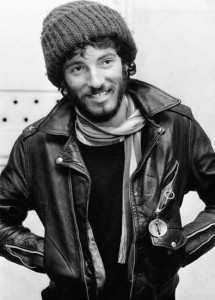 The rest, as they say, is history. By the end of the “Born to Run” tour, Bruce would belong to the rest of the world. (And I’d have to work really hard to get tickets!) He released his long-awaited “Darkness on the Edge of Town” LP to rave reviews. This hauntingly beautiful album – full of darkness and light, promise and doubt – is Bruce’s personal favorite and a top pick of many rock critics. The record depicts a man born into this life, paying for the sins of somebody else’s past. Bruce had left the boardwalk forever to enter those rusted factory gates. For me, these songs were just plain sad. The darkness on the edge of town was calling me, but the quirky street characters weren’t there to pull me in.
The rest, as they say, is history. By the end of the “Born to Run” tour, Bruce would belong to the rest of the world. (And I’d have to work really hard to get tickets!) He released his long-awaited “Darkness on the Edge of Town” LP to rave reviews. This hauntingly beautiful album – full of darkness and light, promise and doubt – is Bruce’s personal favorite and a top pick of many rock critics. The record depicts a man born into this life, paying for the sins of somebody else’s past. Bruce had left the boardwalk forever to enter those rusted factory gates. For me, these songs were just plain sad. The darkness on the edge of town was calling me, but the quirky street characters weren’t there to pull me in.
By 1984 Bruce had became an international superstar upon the release of his hit-filled album “Born in the USA.” The music execs prettied him up with dermabrasion and dental work. A buff Bruce with carefully-placed bandanas embarked on massive tours of 100,000-seat stadiums. He’d go on to sing soaring anthems and heartfelt ballads with serious social messages, helping to lift up Americans in troubled times. It is all good and necessary. Like any true artist, Bruce is constantly evolving. I deeply respect and admire his social consciousness. But still, deep inside, I miss the early days when Bruce sang I ain’t here on business baby, I’m only here for fun.
Springsteen is a true American working class hero. Bono said it best when he inducted Bruce into the Rock-n-Roll Hall of Fame in 1999: “We call him the Boss. Well that’s a bunch of crap. He’s not the boss. He works for us. More than a boss, he’s the owner, because more than anyone else, Bruce Springsteen owns America’s heart.”
I continue to see Bruce and the boys whenever and wherever I can (even if it means traveling to Germany to see him, as I did in 1999 with my fab friend and Backstreets sister Jane McCreery). I’m gearing up for my 25th concert on November 4, 2011. Because there is still nothing that can compare to the sheer joy and energy of a Springsteen show.
Here’s my all-time favorite Springsteen song, “Incident on 57th Street,” from his second LP. Goodnight, it’s alright, Jane.
© Dana Spiardi, Nov 2, 2011
]]>
His first blip on the radar came when John Lennon and Paul McCartney both named him their favorite American artist during a 1968 press conference to announce the formation of Apple Corp. And who could fault their choice? Harry’s voice was flawless and sublime. His writing addressed every conceivable human condition.
Satire: “Good Old Desk” (Did you notice the initials? My old desk doesn’t arabesque, in the morning when I first arrive. It’s a pleasure to see it’s waiting there for me, to keep my hopes alive )
Absurdity: “Coconut” (doctor, ain’t their nothin’ I can take to relieve this belly-ache? Put de lime in the coconut and call me de the morning)
Irony: “1941” (Well in 1941 a happy father had a son. And by 1944 the father walked right out the door. Now in 1961 a happy father had a son. And by 1964 the father walked right out the door)
Hope mixed with desperation: “Don’t Forget Me” (And when we’re older and full of cancer, it doesn’t matter now, come on get happy. ‘Cause nothing lasts forever, but I will always love you)
Loneliness: “One” (One is the loneliest number that you’ll ever do. Two can be as bad as one, it’s the loneliest number since the number one)
Irreverence: “I’d Rather Be Dead” (than wet my bed)
Harry could…
Belt out tear-jerkers: the Pete Ham/Tom Evans composition “Without You” (You always smile, but in your eyes your sorrow shows, yes, it shows)
Croon country: Fred Neil’s “Everybody’s Talking” (which won a Grammy after it was featured on the soundtrack of the film ‘Midnight Cowboy’)
Purr pop: “Cuddly Toy” (You’re not the only cuddly toy that was ever enjoyed by any boy. You’re not the only choo-choo train that was left out in the rain the day after Santa came)
Scream rock: “Jump Into the Fire” (who can forget how this song revved up the action in the ‘Goodfellas’ scene featuring a coked-up Ray Liotta trying to escape a helicopter?)
Reinvent classics: “It Had To Be You” (his lovely take on the old classic written by Isham Jones and Gus Kahn in 1924)
And break your heart with tender-sweet melodies: “The Lottery Song” (“Loo loo loo loo.” Nobody could harmonize with themselves like Harry)
His songs were so diverse, multi-layered, beautifully performed, and elegantly arranged, that I do believe you could think of him as four Beatles rolled into one zany, whip-smart, hard-living American boy.
Now, here’s a little video I created in tribute to him, cut to my favorite Harry song. I don’t gamble or play the lottery, but this one has special meaning for me. It’s for the dreamers.
RIP, Nilsson Schmilsson, you crazy genius.
© Dana Spiardi, Jan 15, 2016
]]>I was going to put a lot of work into this column, maybe call an Allegheny County councilman or a Pittsburgh school board member and then grind out some serious public policy analysis. Then I thought, what for? Steve Miller just got elected to the Rock and Roll Hall of Fame and he has never agonized over a single word.
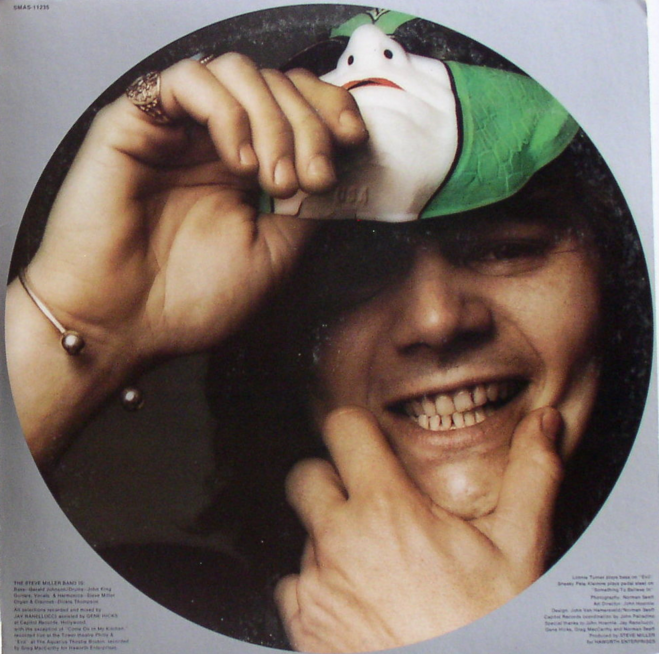 In Mr. O’Neill’s column titled “In Steve Miller’s rockin’ triumph, words fail,” he accuses the soon-to-be inducted Rock and Roll Hall of Famer of writing ridiculous rhymes (El Paso coupled with hassle) and repeating phrases ad infinitum. The two prime examples — take the money and run (sung 11 times in less than three minutes) and keep on a-rockin’ me baby (chanted 21 times in three minutes, seven seconds) — are from two of Miller’s highest-charting singles. And then there’s that infamous pompatus of love line from “The Joker” that’s taken on a life of its own and actually inspired the title of a 1996 film. (Hey, who doesn’t know at least one baby-boomer dude who fancies himself a picker, grinner, lover, sinner, joker, smoker, and midnight toker?)
In Mr. O’Neill’s column titled “In Steve Miller’s rockin’ triumph, words fail,” he accuses the soon-to-be inducted Rock and Roll Hall of Famer of writing ridiculous rhymes (El Paso coupled with hassle) and repeating phrases ad infinitum. The two prime examples — take the money and run (sung 11 times in less than three minutes) and keep on a-rockin’ me baby (chanted 21 times in three minutes, seven seconds) — are from two of Miller’s highest-charting singles. And then there’s that infamous pompatus of love line from “The Joker” that’s taken on a life of its own and actually inspired the title of a 1996 film. (Hey, who doesn’t know at least one baby-boomer dude who fancies himself a picker, grinner, lover, sinner, joker, smoker, and midnight toker?)
Now, Mr. O’Neill’s not knocking Steve Miller’s musicianship or popularity, mind you. He acknowledges the guitarist’s solid blues roots as a sideman for giants like Howlin’ Wolf and Muddy Waters, and references his contributions to the psychedelic hippie music fest scene of the ‘60s. He validates Miller’s commercial success by quoting Sean McDowell, a DJ at Pittsburgh’s premier classic rock station WDVE-FM, who wows us with the fact that The Steve Miller Band’s “Greatest Hits 1974-78” LP sold over 13 million copies, topping sales of both “Abbey Road” and “Elvis’ Christmas Album.’’
I got a nostalgic, summer-breeze feeling reading Mr. O’Neill’s description of the culture of mid-1970s rock fans and their “nights in smoke-filled Camaros listening to the 8-track player.” Ah, memories. In my hometown you couldn’t escape the sounds of Steve Miller’s “Fly Like an Eagle” LP blasting from big black 6×9 speakers jammed up against the rear windows of old VW bugs and Gremlins. Now, that LP may not have been a groundbreaking piece of work, but it was solid enough that Rolling Stone magazine supposedly voted it 1976’s best album and later pegged it at #445 on its list of 500 greatest albums of all time. It stood its own, style wise, among the mediocre mass-produced music that was saturating the airwaves in the mid to late 1970s: disco, Southern California soft-soap, and arena rock performed by god-like figures who shunned underwear.
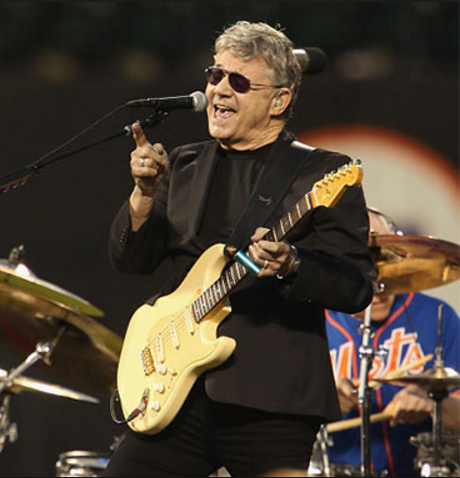 Okay, now that we’ve justified Steve Miller’s induction into the Rock and Roll Hall of Fame on the basis of his musicianship, let’s get back to those lyrics. Abracadabra, they really reach out and grab ya! But keep in mind that Miller is far from being the only Rock and Roll Hall of Fame inductee guilty of writing repetitious hooks or lame rhymes. James Brown sang the word please 22 times in his 1956 single “Please, Please, Please.” The Beatles sang the phrase all you need is love 12 times in their 1967 hit song of the same name. They sang the single word love 18 times, and pleaded love is all you need 21 times. That’s a whole lotta love.
Okay, now that we’ve justified Steve Miller’s induction into the Rock and Roll Hall of Fame on the basis of his musicianship, let’s get back to those lyrics. Abracadabra, they really reach out and grab ya! But keep in mind that Miller is far from being the only Rock and Roll Hall of Fame inductee guilty of writing repetitious hooks or lame rhymes. James Brown sang the word please 22 times in his 1956 single “Please, Please, Please.” The Beatles sang the phrase all you need is love 12 times in their 1967 hit song of the same name. They sang the single word love 18 times, and pleaded love is all you need 21 times. That’s a whole lotta love.
And on the subject of embarrassing lyrics, no one tops Songwriter Hall of Fame inductee Jimmy Webb, who penned these immortal words: MacArthur Park is melting in the dark. All the sweet green icing flowing down. Someone left the cake out in the rain. I don’t think that I can take it, ’cause it took so long to bake it. And I’ll never have that recipe again.
In closing, let’s hand it to Rock Hall of Fame inductee Alice Cooper, who spoke for many an artist when he wrote those classic “School’s Out” lyrics: well we got no class, and we got no principles, and we got no innocence. We can’t even think of a word that rhymes.
Thanks, Brian O’Neill, for sparking my interest in an artist and an album I haven’t thought about for a long time. Before I read your piece I was going to put a lot of work into today’s blog post, maybe call a local ethnomusicologist to discuss how Bulgarian rhythms have influenced Robert Plant’s solo work, or grind out a serious piece on how and why David Bowie legitimized gender-bending rock in the early ’70s. Then I thought, what for? Steve Miller just got elected to the Rock and Roll Hall of Fame. And even though there may be other worthy artists who should have preceded him (Joan Baez, Harry Nilsson, Link Wray, and Dick Dale, to name a few), Mr. Miller has earned his right to be there. Doo, doo, doo, doo, doo, doo, doo…that’s living in the USA, for ya!
Here’s a great live clip of Steve in 1972:
(Click here to read Brian O’Neill’s entire Steve Miller column.)
© Dana Spiardi, Dec 22, 2015
]]>Here’s my favorite Frank moment, from the 1957 film “Pal Joey.” I know it’s staged, but I love it. He serenades society girl Mrs. Simpson (the stunning Rita Hayworth, looking gorgeous in her apricot gown) with a Rodgers and Hart song that pokes fun at snobs and phonies. Frank delivers these delicious lyrics with just the right amount of mockery and flirtation. There may have been singers with finer vocal chops, but nobody had Frank’s style. RIP, Pally.
© Dana Spiardi, Dec 12, 2015
]]>